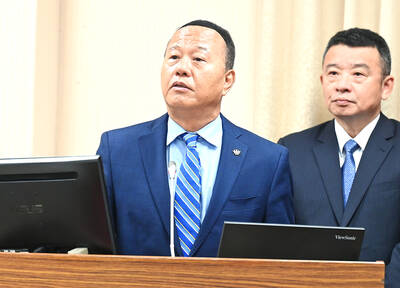Chiayi on Tuesday became the first city outside of the six special municipalities to adopt the same-sex couples’ addendum, but the measure was criticized by same-sex couples as being too little, too late.
The addendum allows same-sex couples to exercise the same rights as family members in medical emergencies, such as signing surgery release forms and being allowed to visit hospitalized partners.
Chiayi Mayor Twu Shiing-jer (涂醒哲) told a news conference that the household registration offices in the East District (東區) and West District (西區) will begin processing registration applications by same-sex couples next month.
However, a man using the pseudonym “66” complained at the news conference that the move came too late and offered too little.
Citing the Tainan City Government’s adoption of the addendum, “66” said applicants in Tainan were able to have the addendum stamped on their household registration documents, but Chiayi does not allow such open registration. It also requires both partners to be registered residents of Chiayi, he said.
While the city government has made an effort to promote same-sex rights, the limitations have dampened the spirits of many of his friends, he said.
Chiayi officials said that the addendum could not be openly marked on household registration documents because it lacks legal backing, as same-sex marriage has yet to be legalized in the nation.
Twu also said that the city’s announcement was a tentative first step before the Civic Code could be amended to legalize same-sex marriage, and the city government is open to suggestions on how to improve the measures.
Representatives of several groups who attended the news conference called on the government to be more active in promoting lesbian, gay, bisexual and transgender (LGBT) rights.
They suggested incorporating same-sex issues into sex education, hosting activities involving LGBT groups and establishing a friendlier working and medical environments toward LGBT people.

An increase in Taiwanese boats using China-made automatic identification systems (AIS) could confuse coast guards patrolling waters off Taiwan’s southwest coast and become a loophole in the national security system, sources familiar with the matter said yesterday. Taiwan ADIZ, a Facebook page created by enthusiasts who monitor Chinese military activities in airspace and waters off Taiwan’s southwest coast, on Saturday identified what seemed to be a Chinese cargo container ship near Penghu County. The Coast Guard Administration went to the location after receiving the tip and found that it was a Taiwanese yacht, which had a Chinese AIS installed. Similar instances had also

GOOD DIPLOMACY: The KMT has maintained close contact with representative offices in Taiwan and had extended an invitation to Russia as well, the KMT said The Chinese Nationalist Party (KMT) would “appropriately handle” the fallout from an invitation it had extended to Russia’s representative to Taipei to attend its international banquet last month, KMT Chairman Eric Chu (朱立倫) said yesterday. US and EU representatives in Taiwan boycotted the event, and only later agreed to attend after the KMT rescinded its invitation to the Russian representative. The KMT has maintained long-term close contact with all representative offices and embassies in Taiwan, and had extended the invitation as a practice of good diplomacy, Chu said. “Some EU countries have expressed their opinions of Russia, and the KMT respects that,” he

VIGILANCE: The military is paying close attention to actions that might damage peace and stability in the region, the deputy minister of national defense said The People’s Republic of China (PRC) might consider initiating a hack on Taiwanese networks on May 20, the day of the inauguration ceremony of president-elect William Lai (賴清德), sources familiar with cross-strait issues said. While US Secretary of State Anthony Blinken’s statement of the US expectation “that all sides will conduct themselves with restraint and prudence in the period ahead” would prevent military actions by China, Beijing could still try to sabotage Taiwan’s inauguration ceremony, the source said. China might gain access to the video screens outside of the Presidential Office Building and display embarrassing messages from Beijing, such as congratulating Lai

Four China Coast Guard ships briefly sailed through prohibited waters near Kinmen County, Taipei said, urging Beijing to stop actions that endanger navigation safety. The Chinese ships entered waters south of Kinmen, 5km from the Chinese city of Xiamen, at about 3:30pm on Monday, the Coast Guard Administration said in a statement later the same day. The ships “sailed out of our prohibited and restricted waters” about an hour later, the agency said, urging Beijing to immediately stop “behavior that endangers navigation safety.” Ministry of National Defense spokesman Sun Li-fang (孫立方) yesterday told reporters that Taiwan would boost support to the Coast Guard